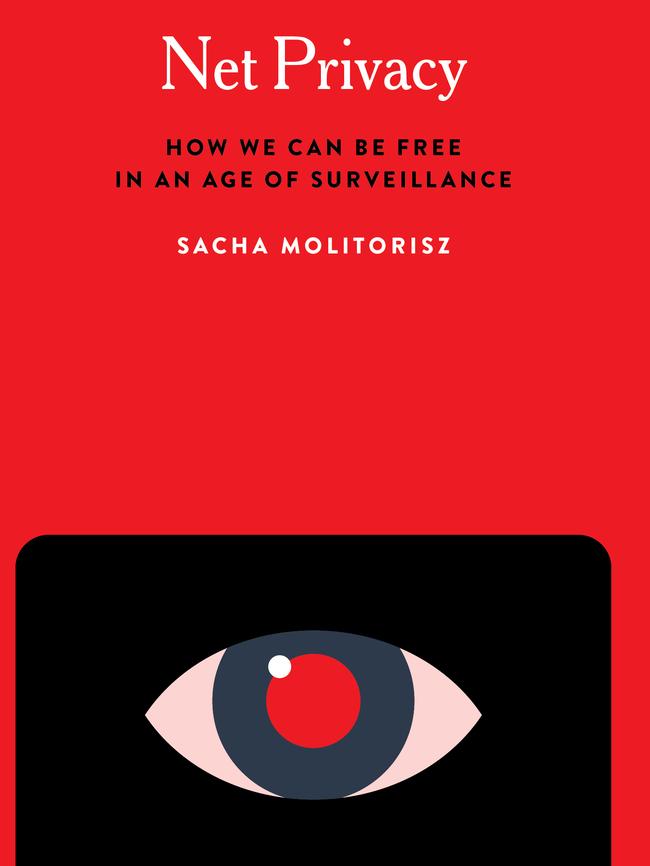What’s mine is yours …
In Net Privacy: How We Can Be Free in an Age of Surveillance, Sacha Molitorisz notes that privacy in the digital age is deceptive.

In Net Privacy: How We Can Be Free in an Age of Surveillance, Sydney-based media theorist Sacha Molitorisz notes that privacy in the digital age is deceptive.
“If my smartphone’s location is being tracked and my internet use is being monitored, then the seemingly private is indeed not really so very private at all.”
He’s not the first to have made the point but his approach to it might be usefully compared with other accounts of digital privacy and its protection. He links the moral foundations of such privacy to the thinking of 18th-century philosopher Immanuel Kant.
His initial discussion of the technological and social dimensions of growing encroachments on privacy, so tied to the development of digital innovation and the commercial imperatives that drive it, engages issues others have addressed in equal depth.
What Molitorisz adds to this discourse is a sustained focus on the nature of privacy itself, and why its preservation, alongside a need for access to facts of public interest, is morally important.

Does the user-control of personal data entail a genuine safeguarding of privacy? Does government regulation preserve the right kind of balance between privacy protection and the freedom of speech and free media required for robust democracy?
Is liberal democracy capable of restraining the private sector, or are democratic politics, military interests and corporate power already irremediably enmeshed, as many critics of neoliberal overreach typically claim?
Or is privacy simply an old-world value that, in the wake of the juggernaut of digital technologies, will necessarily fall by civilisation’s wayside, as Mark Zuckerberg was once wont to suggest?
These are not simple questions, and Molitorisz ultimately aims to prompt the reform that might legislate his answers to them. It seems that Kant’s ‘‘formula of humanity”, in which persons must never be instrumentalised as means to an end but always treated as ends in themselves, will be doing hard work to answer these defiantly 21st-century questions.
Molitorisz prosecutes his argument with some persuasion, and also performs the useful purpose of engaging many of the concerns that cypherpunk theorists, whistleblowers and groundbreaking litigation have brought to international, and often controversial, attention.
Referring to the 2018 revelations of the Cambridge Analytica data harvesting of Facebook user profiles, Molitorisz notes that “privacy is collective and ‘networked’, rather than purely individualistic”.
He continues, “My privacy matters for your benefit, and vice versa. Privacy only properly makes sense when we think of it as relational”.
With this claim, itself a challenge to individualist libertarian grounds for privacy rights, Molitorisz wants to put Kant’s ideas to expanded work in his own “relational account of privacy”, by addressing why cyber privacy is a problem, what it is about privacy that makes it important, and how this value can be protected.
Some existing rights to privacy are legally undergirded by such mechanisms as Australia’s 1988 Privacy Act or the prohibition of “computer intrusions” contained in the Australian Criminal Code Act of 1995. At the same time he notes that Australia is significantly expanding state reliance on facial recognition technology.
The Identity-matching Services Bill, introduced to parliament in 2019, proposes that an Australian government database could compile images from passports, driver’s licences and other photo ID. Yet Molitorisz also admits that privacy “has found a modest home online” above all in the complementary modes of anonymity, encryption and security.
But the kind of privacy to be protected is crucial, and for Molitorisz it “needs to be valued and protected appropriately, not absolutely. It must always be considered in balance with other values and rights”.
He sketches an access model whereby such a right equates to “others being deprived of unauthorised access to me and information about me”. Privacy is only ensured where all unauthorised others are denied such access, whether by one’s own will, or by externally imposed legal or social norms.
He elaborates four essential grounds for valuing privacy in dignity, autonomy, relationships and democratic society.
Human dignity, following Kant, is for Molitorisz intrinsically valuable, dependent on “the ability of rational beings to autonomously legislate the universal moral law”. This condition relies heavily on both the rational competence of moral agency and the existence of a rationally self-evident universal moral law.
Molitorisz must do some theoretical fine-tuning to successfully appropriate Kantian reason, and thus dignity, to his overall project, especially where other privacy theorists are happy to subsume the latter in a notion of autonomy. He does this largely by combining Kantian dignity with personal autonomy and other complementary social values.
Here again the focus is on elaborating how dignity and autonomy are implicitly relational rather than individualistic, and relationships and democratic society explicitly so. The Kantian apparatus is justified for Molitorisz because only by regarding others as autonomous rational agents are potentially intrusive acts of surveillance checked and restricted: it enables such agents, crucially via their consent or dissent, to license or veto those acts.
Thus possible and actual consent is the cornerstone of an applied ethics of net privacy. Molitorisz goes to great lengths to spell out how this could be secured in both individual and collective terms, bridging ethical and political-legal domains.
At almost 350 pages, Net Privacy is expansive and sometimes repetitive, but its central argument is robust and takes in an impressive breadth of detail. As with any program of reform, a question remains as to how far theory is able to become normative practice.
But Molitorisz provides much-needed groundwork for the theory and, identifying the European General Data Protection Regulation of 2018 as a legal template to which other national legislatures might refer, recommends potential policy advances as well.
Individuals, organisations and governments would be well placed, on this rational and relational basis, to establish a genuinely ethical net privacy in the time to come.
Martin Kovan is a Sydney-based writer and ethicist. His novel, K the Interpreter, was shortlisted for the 2020 Dorothy Hewett Award.
NNet Privacy: How Can We Be Free in an Age of Surveillance
By Sacha Molitorisz
NewSouth, 369pp, $34.99



To join the conversation, please log in. Don't have an account? Register
Join the conversation, you are commenting as Logout